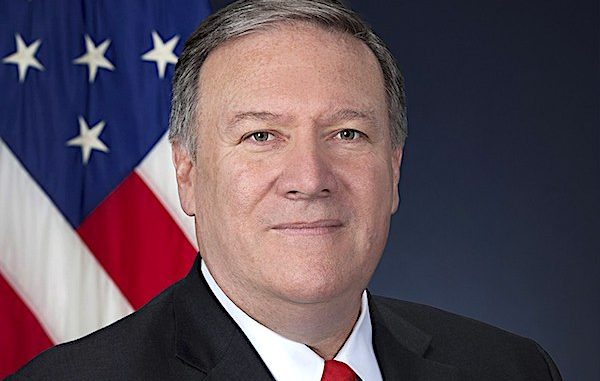
By Jack Davis, The Western Journal Published January 10, 2021 at 4:18pm
Secretary of State Mike Pompeo on Saturday threw out the rulebook for dealing with Taiwan.
Pompeo announced that the State Department has ended rules meant to prohibit official contacts with Taiwanese officials, according to a statement on the State Department website.
China claims that Taiwan, the island where the Chinese nationalist government took refuge in 1949 when the communists swept to power on the mainland, is rightfully part of the country. It opposes any recognition of the island’s government. The U.S. does not maintain formal diplomatic relations with Taiwan, but provides arms and support.
“Taiwan is a vibrant democracy and reliable partner of the United States, and yet for several decades the State Department has created complex internal restrictions to regulate our diplomats, servicemembers, and other officials’ interactions with their Taiwanese counterparts. The United States government took these actions unilaterally, in an attempt to appease the Communist regime in Beijing. No more,” Pompeo said.
“Today I am announcing that I am lifting all of these self-imposed restrictions. Executive branch agencies should consider all ‘contact guidelines’ regarding relations with Taiwan previously issued by the Department of State under authorities delegated to the Secretary of State to be null and void,” he said.
TRENDING: Trump exposed the left’s plan to cancel the right
“The United States government maintains relationships with unofficial partners around the world, and Taiwan is no exception. Our two democracies share common values of individual freedom, the rule of law, and a respect for human dignity. Today’s statement recognizes that the U.S.-Taiwan relationship need not, and should not, be shackled by self-imposed restrictions of our permanent bureaucracy,” he said.
Taiwan was pleased.
“Decades of discrimination, removed. A huge day in our bilateral relationship. I will cherish every opportunity,” Hsiao Bi-khim, Taiwan’s representative to Washington, wrote in a Twitter post.
China was much less happy.
“If this is the new starting point of US’ Taiwan policy, it will also start the countdown of the survival of the Taiwan authority,” Hu Xijin, editor of the state-run Global Times, wrote in a Twitter post, according to The New York Times. (The post is no longer available.)
“The option of using military means to solve Taiwan question will also be put on the table,” he added, noting that fighter jets could fly over the island “at any time.”
Evan Medeiros, a professor at Georgetown University and a former National Security Council staff member, told The Times that the issue was not what the new rules might mean, but what they actually would achieve in the waning days of the Trump administration.
“It looks like a publicity stunt,” he said, according to The Times, “The administration is over in two weeks.”
The move could put the Biden administration in the uncomfortable position of either leaving Pompeo’s policy in place, which would get relations with Beijing off to a rocky start, or rescinding it, which could give the appearance that the new president is cozying up to the Chinese government at the expense of Taiwan.
Pompeo also joined U.S. allies in condemning last week’s arrests of Hong Kong leaders.
“We, the Foreign Ministers of Australia, Canada, and the United Kingdom, and the United States Secretary of State, underscore our serious concern at the mass arrests of 55 politicians and activists in Hong Kong for subversion under the National Security Law,” a statement on the State Department website declared.
“The National Security Law is a clear breach of the Sino-British Joint Declaration and undermines the ‘One Country, Two Systems’ framework. It has curtailed the rights and freedoms of the people of Hong Kong. It is clear that the National Security Law is being used to eliminate dissent and opposing political views,” the statement said.
On Thursday, Pompeo announced that Kelly Craft, the U.S. ambassador to the United Nations, will visit Taiwan, according to Reuters.
The visit will be the first to the island by a sitting U.S. ambassador to the U.N., Reuters reported.
“Taiwan shows what a free China could achieve,” Pompeo said, according to Reuters.
Chinese Foreign Ministry spokeswoman Hua Chunying said Pompeo’s comments are interference China’s internal affairs.
“China will take all necessary steps to resolutely safeguard its sovereignty and security interests,” Hua told reporters, according to Reuters. “The United States must pay a heavy price for its mistakes.”
This article appeared originally on The Western Journal.
